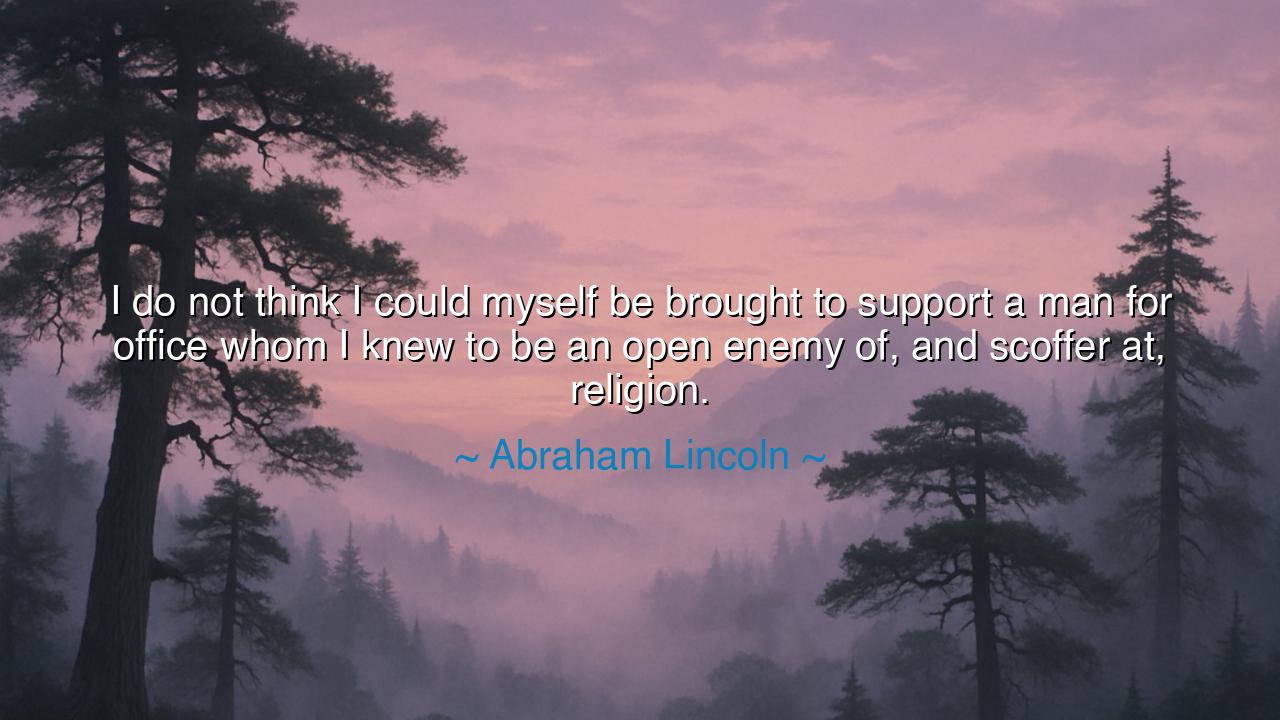
I do not think I could myself be brought to support a man for
I do not think I could myself be brought to support a man for office whom I knew to be an open enemy of, and scoffer at, religion.






Hear the solemn words of Abraham Lincoln, who declared: “I do not think I could myself be brought to support a man for office whom I knew to be an open enemy of, and scoffer at, religion.” These words, spoken by one of the greatest leaders of the American people, reveal not only his political judgment but also his understanding of the deep bond between faith, morality, and public trust. For Lincoln knew that the strength of a nation does not rest upon its laws alone, nor upon its armies, but upon the conscience of its leaders, and conscience is often nourished by religion.
The origin of this saying lies in a time when Lincoln, though often wrestling with questions of belief himself, recognized the central place of faith in the life of the people. He was no blind zealot, no preacher thundering from the pulpit, but a man who saw that leaders who openly scorn the sacred weaken the moral fabric of society. To him, a leader who mocks religion reveals a heart hardened against reverence, and such a heart, he feared, could not be trusted to wield power with humility or justice.
Consider the trials of Lincoln’s own life. He walked through the valley of shadows—poverty, grief, and the agony of civil war. In those darkest hours, he turned again and again to the language of Scripture, speaking of the Almighty in his speeches, calling the nation to prayer and fasting. Whether or not he fully embraced one creed, he understood that faith bound people together and gave them courage to endure. Could a man who scorned these sacred sources of strength ever rally a people toward unity and sacrifice? Lincoln thought not.
History gives us many examples that echo this truth. In the French Revolution, when leaders sought to tear down religion itself, churches were desecrated, priests banished, and the “Goddess of Reason” enthroned. For a moment, it seemed that reason alone would govern. Yet without reverence, chaos reigned. The guillotine devoured both the innocent and the guilty, and the Revolution that sought liberty collapsed into tyranny. Here we see what Lincoln feared: when leaders mock the sacred, they loosen the cords that bind a people to higher principles, and destruction soon follows.
Yet Lincoln’s words are not only a warning against irreligion—they are also a call to honor the place of faith in public life. Faith, whatever its form, teaches humility before forces greater than oneself, reminds leaders that they are but servants of a higher justice, and guides them to act not only with power but with mercy. The scoffer, on the other hand, risks arrogance, placing himself above both God and man, and such arrogance leads only to ruin.
The lesson, O listener of tomorrow, is this: when you place your trust in leaders, look not only to their skills or their promises, but to the reverence of their hearts. Do they honor the sacred? Do they acknowledge limits beyond themselves? Or do they mock what others hold holy? A leader without reverence is a ship without anchor, drifting toward destruction.
Therefore, take action. In your own life, honor faith, whether in prayer, in gratitude, or in respect for the beliefs of others. And when you raise up leaders, choose those who carry humility, who speak with respect for the sacred, who do not scoff at what gives strength to the people. For as Lincoln knew, a nation led by scoffers will decay, but a nation led by the reverent may yet endure through trial and triumph alike.






AAdministratorAdministrator
Welcome, honored guests. Please leave a comment, we will respond soon